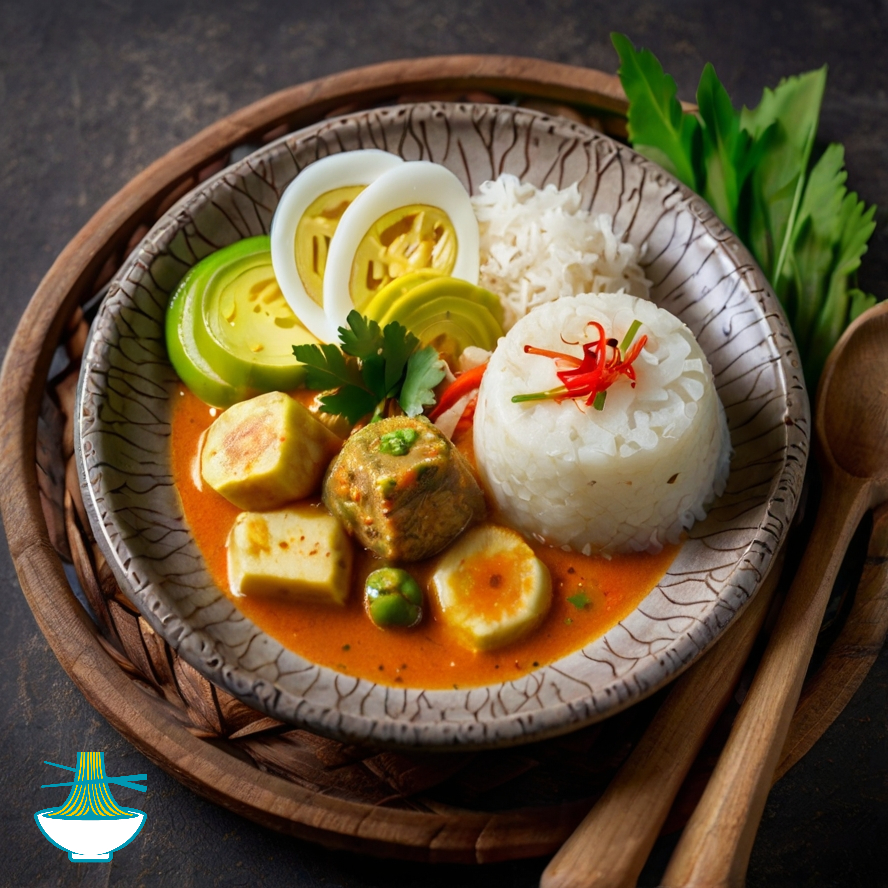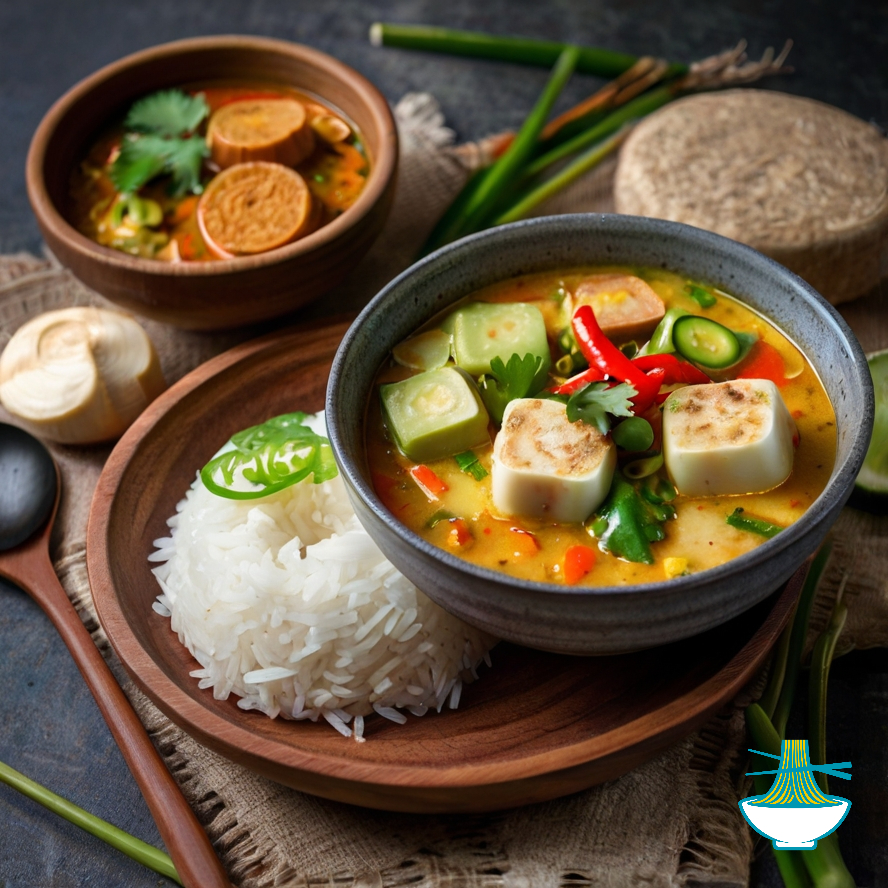Experience the rich flavors of Indonesia with Lontong Sayur, a delightful vegetarian dish featuring compressed rice cake or lontong served in a spicy coconut milk soup. This traditional dish is complemented with a variety of vegetables, creating a satisfying and aromatic meal that will transport you to the bustling streets of Indonesia.
Here's a recipe for Indonesian Lontong Sayur:
Ingredients:
- 200g rice, washed and soaked for 4 hours
- 1/2 teaspoon salt
- 400ml coconut milk
- 500ml vegetable stock
- 1 lemongrass, smashed
- 2 kaffir lime leaves
- 200g cabbage, shredded
- 100g green beans, cut into 3cm lengths
- 100g carrots, cut into matchsticks
- 100g bean sprouts
- 2 tablespoons vegetable oil
- 2 shallots, finely sliced
- 2 cloves garlic, finely sliced
- 1 teaspoon galangal, grated
- 1 teaspoon turmeric, grated
- 1 teaspoon salt
- 1 teaspoon sugar
- 1/2 teaspoon pepper
Instructions:
1- Drain the soaked rice and place it in a cheesecloth. Form it into a cylindrical shape and tie the ends securely. Boil the rice in a pot of water for about 2 hours. Remove from the water, let it cool, then cut into slices.
2- In a large pot, combine the coconut milk, vegetable stock, lemongrass, and kaffir lime leaves. Bring to a simmer over medium heat.
3- Add the cabbage, green beans, carrots, and bean sprouts to the pot. Simmer for about 10 minutes, or until the vegetables are tender.
4- In a separate pan, heat the vegetable oil over medium heat. Add the shallots, garlic, galangal, and turmeric. Cook for about 5 minutes, or until the shallots are soft and translucent.
5- Add the cooked vegetables to the pot with the coconut milk mixture. Season with salt, sugar, and pepper. Simmer for another 5 minutes to allow the flavors to meld.
6- To serve, place a few slices of compressed rice cake in a bowl and ladle the vegetable stew over the top. Enjoy your delicious Indonesian Lontong Sayur!
Nutritional Values :
Here's an approximate nutritional breakdown for the main ingredients in the Indonesian Lontong Sayur recipe. Please note that these values are estimates and can vary based on specific brands and quantities used:
Rice (200g)
- Calories:720 kcal
- Fat: 1g
- Carbohydrates: 160g
- Protein: 12g
Benefits: Rice is a staple carbohydrate source, providing energy. It's also gluten-free, making it suitable for those with gluten intolerance.
Salt (1/2 tsp):
- Calories: 0 kcal
- Fat: 0g
- Carbohydrates: 0g
- Protein: 0g
Benefits: Essential for maintaining electrolyte balance in the body but should be used in moderation.
Coconut Milk (400ml):
- Calories:720 kcal
- Fat: 72g (mostly saturated fat)
- Carbohydrates: 16g
- Protein: 8g
Benefits: Coconut milk adds richness and flavor to dishes and provides medium-chain triglycerides (MCTs), which may aid in weight management and provide quick energy.
Vegetable Stock (500ml):
- Calories:40 kcal (varies depending on ingredients)
- Fat: 0g
- Carbohydrates: 8g
- Protein: 2g
Benefits: Stock adds flavor and some nutrients from vegetables, aiding in digestion and hydration.
Lemongrass (1 stalk):
- Calories: 5 kcal
- Fat: 0g
- Carbohydrates: 1g
- Protein: 0.1g
Benefits: Lemongrass is known for its antioxidant properties and can aid in digestion and relieve bloating.
Kaffir Lime Leaves (2 leaves):
- Calories: Negligible
- Fat: 0g
- Carbohydrates: 0.2g
- Protein: 0.1g
Benefits: Kaffir lime leaves add a citrusy flavor and are rich in antioxidants, which can boost immunity and digestion.
Cabbage (200g):
- Calories: 50 kcal
- Fat: 0.3g
- Carbohydrates: 12g
- Protein: 3g
Benefits: Cabbage is low in calories and high in fiber, vitamins C and K, and antioxidants, which support digestive health and reduce inflammation.
Green Beans (100g):
- Calories: 31 kcal
- Fat: 0.2g
- Carbohydrates: 7g
- Protein: 2g
Benefits: Green beans are a good source of vitamins A, C, and K, fiber, and folic acid, supporting overall health and reducing the risk of chronic diseases.
Carrots (100g):
- Calories: 41 kcal
- Fat: 0.2g
- Carbohydrates: 10g
- Protein: 1g
Benefits: Carrots are rich in beta-carotene, fiber, vitamin K1, and potassium, promoting eye health and reducing the risk of cancer.
Bean Sprouts (100g):
- Calories: 31 kcal
- Fat: 0.2g
- Carbohydrates: 6g
- Protein: 3g
Benefits: Bean sprouts are low in calories and high in fiber, vitamins C and K, and folate, supporting digestive health and reducing inflammation.
Vegetable Oil (2 tablespoons):
- Calories:240 kcal
- Fat: 28g
- Carbohydrates: 0g
- Protein: 0g
Benefits: Provides healthy fats necessary for absorbing fat-soluble vitamins. Should be used in moderation to avoid excessive calorie intake.
Shallots (2 finely sliced):
- Calories:16 kcal
- Fat: 0g
- Carbohydrates: 4g
- Protein: 0.4g
Benefits: Shallots are rich in antioxidants and have anti-inflammatory properties. They also add a subtle sweetness to dishes.
Garlic (2 cloves, finely sliced):
- Calories:8 kcal
- Fat: 0g
- Carbohydrates: 2g
- Protein: 0.4g
Benefits: Garlic is known for its immune-boosting properties, as well as its ability to lower cholesterol and blood pressure.
Galangal (1 tsp, grated):
- Calories: 4 kcal
- Fat: 0g
- Carbohydrates: 1g
- Protein: 0g
Benefits: Galangal is similar to ginger and has anti-inflammatory and antioxidant properties, aiding digestion and improving circulation.
Turmeric (1 tsp, grated):
- Calories: 4 kcal
- Fat: 0.2g
- Carbohydrates: 1g
- Protein: 0.2g
Benefits: Turmeric contains curcumin, a powerful anti-inflammatory and antioxidant compound that supports heart health and aids in digestion.
Sugar (1 tsp):
- Calories:16 kcal
- Fat: 0g
- Carbohydrates: 4g
- Protein: 0g
Benefits: Provides a quick source of energy but should be consumed in moderation to avoid spikes in blood sugar levels.
Pepper (1/2 tsp):
- Calories: 3 kcal
- Fat: 0g
- Carbohydrates: 1g
- Protein: 0.1g
Benefits: Black pepper is rich in antioxidants and can improve digestion and nutrient absorption.
These values are based on standard USDA data and may vary depending on the specific brands and types of ingredients used.


Comments